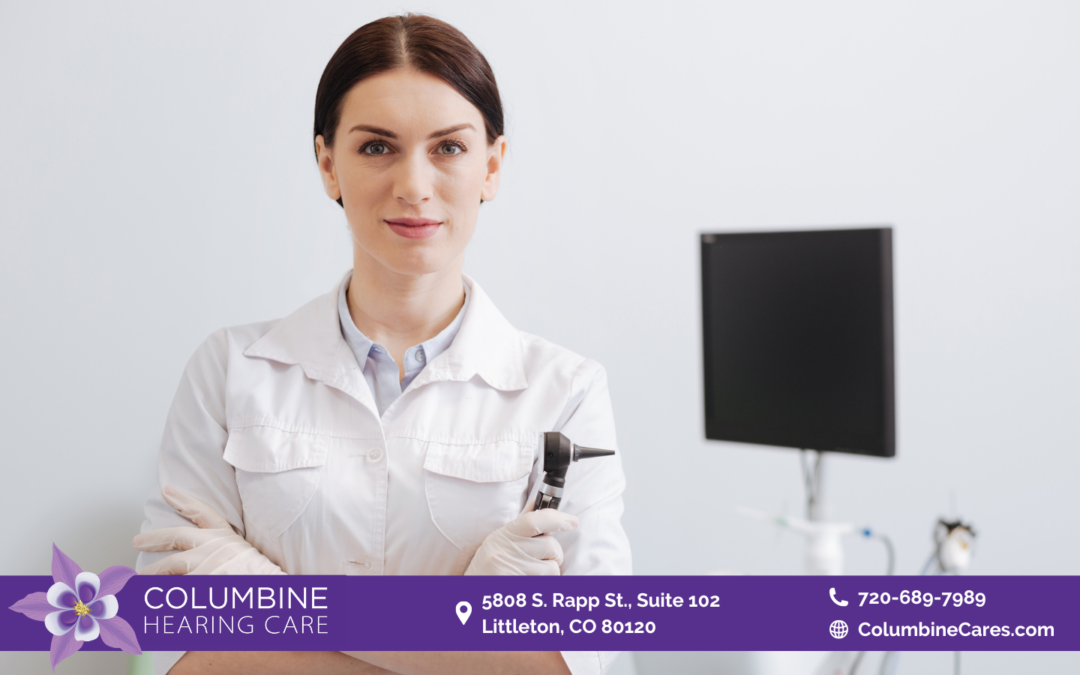Hearing is a precious sense that allows us to connect with others, communicate, and enjoy the sounds of the world around us. However, for millions of people all over the world, hearing loss poses significant challenges. This is where audiologists, also known as hearing doctors, step in.
In this blog, we will explore the role of audiologists in treating hearing loss, conducting hearing tests, recommending and fitting hearing aids, and delivering comprehensive hearing care.
Are you looking for an audiologist in Littleton, CO? Give us a call at Columbine Hearing Care to be connected to our reliable hearing experts.
What is an Audiologist?
Audiologists, or hearing doctors, are medical professionals who specialize in the diagnosis, evaluation, and treatment of hearing and balance disorders. They hold advanced degrees in audiology and are licensed to practice audiology, making them the primary experts in the field of hearing health.
Hearing Tests and Diagnosis
One of the essential duties of an audiologist is to conduct thorough and comprehensive hearing tests. Through a variety of tools and techniques, they assess a person’s hearing abilities, identify hearing loss, and determine the type and degree of the impairment.
Hearing tests are conducted in a controlled and comfortable environment within a hearing center or clinic, ensuring accurate results.
Audiologist’s Role in Treating Hearing Loss
Once hearing loss has been diagnosed, the audiologist collaborates with the patient to develop a personalized treatment plan. This plan may include a wide selection of options, such as hearing aids, assistive listening devices, aural rehabilitation, cochlear implant candidacy, or referrals to other specialists or healthcare professionals should the hearing loss require additional medical attention.
Hearing Aid Selection and Fitting
Hearing aids are one of the most popular solutions for hearing loss. Audiologists or hearing doctors play an integral role in guiding patients through the process of selecting the right hearing aid.
When choosing a hearing aid, various factors are considered including the extent of hearing loss, lifestyle, hearing needs, budget and preferences. Audiologists also ensure proper fitting and programming of the hearing aids for optimal hearing improvement.
Counseling and Hearing Rehabilitation
Adjusting to hearing loss and new hearing aids can be emotionally challenging for individuals and their spouses or families. Audiologists are trained to provide professional counseling and support throughout the hearing rehabilitation process.
They help patients better understand their hearing loss, manage expectations, and develop effective communication strategies. This comprehensive approach enhances the overall quality of life for people with hearing loss.
Hearing Doctors Provide Continuous Hearing Care
Audiologists provide hearing care that goes beyond the initial diagnosis, hearing aid fitting, and programming. They provide ongoing support, care, and monitoring to ensure optimal hearing health through regular follow-up appointments.
During follow-up appointments, audiologists monitor the effectiveness of the treatment, make necessary adjustments to hearing devices, and address any concerns or changes in the patient’s hearing abilities.
Audiologists need to maintain a proactive approach to ensure that patients receive the best possible care for their evolving hearing needs.
What is the difference between an audiologist and a hearing aid dispenser?
Both audiologists and hearing aid dispensers are involved in the field of hearing healthcare. However, there are key differences in their scope of practice, roles, and qualifications.
Let’s look at these differences:
Education and Training:
Audiologists hold advanced degrees in audiology (master’s or doctoral), which typically requires a minimum of six to eight years of post-secondary education. They undergo intensive academic and clinical training, including coursework in anatomy, acoustics, physiology, diagnostics, amplification, and rehabilitation. Audiologists must be licensed to practice audiology and complete a supervised clinical fellowship.
Meanwhile, hearing aid dispensers, also known as hearing instrument specialists, typically have a high school diploma or an associate’s degree in hearing aid sciences. Their training is primarily focused on the technical aspects of fitting and dispensing hearing aids.
In summary, audiologists provide a wider range of services beyond hearing aid dispensing, including diagnostic evaluations, treatment, rehabilitation, and ongoing audiology care. Hearing aid dispensers primarily focus on the fitting and dispensing of hearing aids and have a narrower scope of practice.
Both play important roles in the field of hearing healthcare, but the depth of their expertise differs based on their education and training.
Audiologists in Littleton, CO
Audiologists play a key role as hearing doctors in providing comprehensive hearing care to individuals with hearing loss.
From conducting comprehensive hearing tests, and diagnosing and treating hearing disorders, to fitting and programming hearing aids, they are the primary experts trained to guide patients through their journey to better hearing.
As the cornerstone of providing hearing solutions through comprehensive audiology care, audiologists are committed to improving the lives of individuals with hearing impairments, enabling them to enjoy the world of sounds once again.
If you or a loved one is experiencing any signs of hearing loss or any hearing-related concerns, reach out to a qualified audiologist to get an assessment.
Columbine Hearing Care provides comprehensive audiology services in Littleton, CO, and nearby areas. Contact us today to schedule an appointment with one of our audiologists or our experienced hearing instrument specialist!

